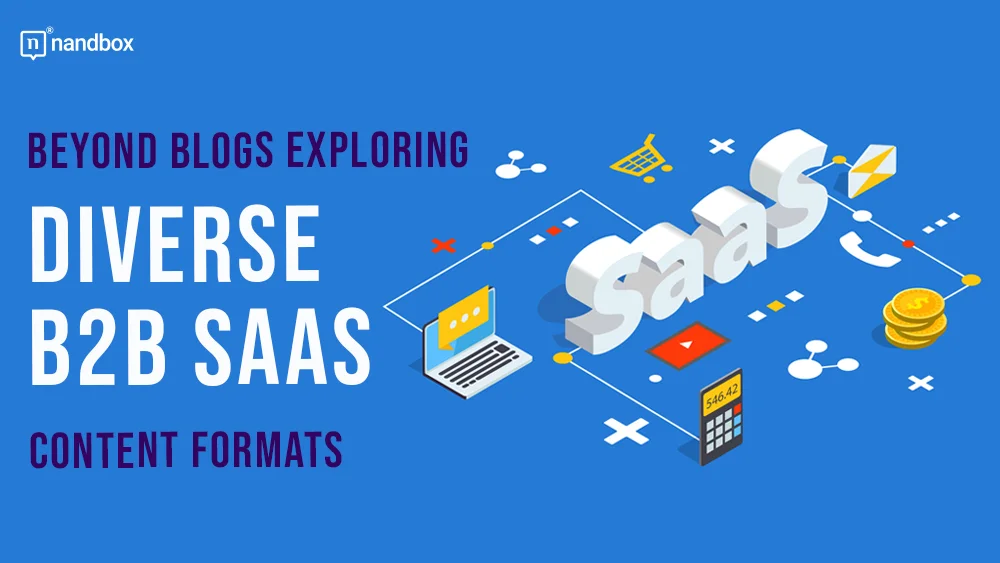In today’s era, the saying “content is king” holds true. For businesses aiming to excel in the B2B SaaS sector, a crafted content marketing strategy is crucial. While blogs have traditionally been a focus, there exists a range of alternative content formats that can be explored to connect with potential customers and foster business expansion. In this article, we’ll explore B2B SaaS content formats beyond blogs. Let’s dive in!
Whitepapers: Extensive Exploration of Industry Subjects
Whitepapers are detailed written pieces that offer an in-depth examination of industry topics or challenges faced by businesses. They provide insights and practical solutions for readers dealing with issues, and what distinguishes whitepapers from blog posts is their length and thoroughness.
By including researched whitepapers in their SaaS content strategy, B2B SaaS companies can establish themselves as industry authorities within their niches. This format enables them to demonstrate their expertise and make a lasting impact on prospects seeking solutions.
Case Studies: Compelling Narratives
Case studies serve as tools for grabbing the attention of clients by illustrating how other businesses have benefited from using a company’s products or services. These success stories showcase real-world instances of problem-solving and successful implementations.
By telling stories backed by data and real-life experiences, B2B SaaS firms can build trust and credibility with clients. Case studies illustrate how their products have positively influenced customers’ operations, making them more relatable to prospects exploring solutions.
E-Books: In-depth Guides on Relevant Subjects

E-books present B2B SaaS companies with an opportunity to craft guides on topics and establish themselves as experts in their industry. Similar to whitepapers but more extensive, e-books deliver insights to readers seeking information or practical advice on particular challenges.
For instance, a CRM software vendor could create an e-book titled ” Strategies for Enhancing Customer Relationships.” By providing tips, actionable suggestions, and expert viewpoints in an e-book format, companies can not only attract potential leads but also engage them through informative content.
Infographics: Engaging Data Visualization
In today’s fast-paced landscape, infographics serve as a great tool for presenting complex data in a visually appealing and easy-to-understand way. B2B SaaS enterprises can use infographics to display survey findings or industry-related statistics, transforming data into captivating content.
Infographics enable businesses to grab attention on media platforms due to their appeal and shareability. Crafting engaging infographics allows businesses to convey messages while also increasing brand visibility effectively.
Webinars and Video Content: Opportunities for Real-Time Engagement
Webinars and video content serve as platforms that offer real-time engagement opportunities. These tools enable B2B SaaS companies to address challenges or educate customers about their products or services on the spot.
Hosting webinars positions companies as experts who genuinely prioritize customer success. They establish a dialogue where prospective clients can ask questions and receive feedback. Likewise, recorded videos help foster trust by putting a face to the business and showcasing authenticity.
Podcasts: Informal Educational Platforms
The popularity of podcasts has surged in recent years, providing B2B SaaS firms with a platform to explore industry-related topics in depth while maintaining a conversational approach. Hosted by industry experts or company thought leaders, podcasts offer content in an easily digestible audio format.
Listeners appreciate the flexibility of learning on the go while forming connections with podcast hosts over time. Podcasts provide lasting exposure for businesses since episodes are accessible indefinitely, potentially attracting audiences with each release.
Final Thoughts
Although blogs have long been a component of content marketing strategies, for B2B SaaS companies, exploring a variety of content formats can bring benefits. From whitepapers and compelling case studies to visually appealing infographics and engaging webinars, businesses have a range of options to provide value and grab their audiences’ attention.
By incorporating content formats, companies can set themselves apart in an industry while delivering creative and educational content that connects with their target audience. Additionally, using formats ensures that marketing strategies remain dynamic and adaptable, supporting growth in a rapidly changing business environment.



